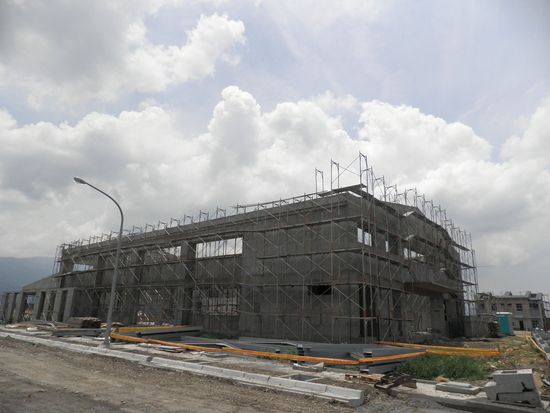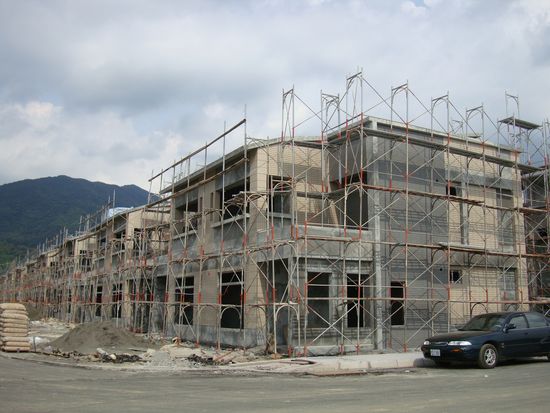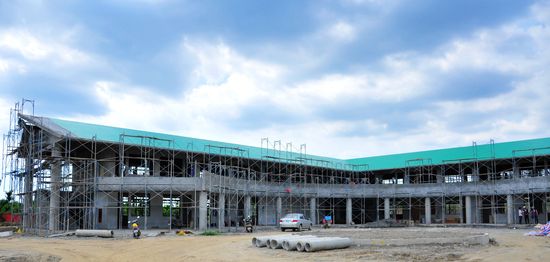


Creating A Sustainable New Home: August 15th Move-in For Nanan and Xinchi Permanent Housing in Pingtung

Nanan Farm and Xinchi Farm permanent housing bases in Pingtung, constructed with the assistance of the Red Cross, will be planning their move-in ceremony on August 15th, in conjunction with the Annual Paiwan Tribe United Harvest Festival so as to offer tribesmen the biggest blessing as they move in. In addition, as reconstruction of Taiwu Elementary School was also completed within the permanent housing base, with assistance from the BenQ Foundation, and a joint opening ceremony was held.
Located in Pingtung County’s Xinpi Township and Wanluan Township respectively, the land for Nanan Farm and Xinchi Farm were originally owned by the Taiwan Sugar Corporation. The Red Cross assisted in the construction of 229 and 117 permanent housing units on each farm to accommodate the disaster victims from Taiwu Township and Laiyi Township. The Executive Yuan’s Reconstruction Council negotiated between various departments to procure land, subsidize funding for public infrastructure on the bases, and helped to consolidate the construction interface so that the permanent housing construction project could be turned over to the Red Cross. Up until now, governmental departments have invested more than NT$800 million in funding, and the project is more than 70% complete. Interior and exterior decoration is currently underway, and the expected project completion date is in July.
The Reconstruction Council stated that the concept of the Rainbow Sustainable Community is being proposed in order to strengthen future living functionality within the base and aid those who move in to enjoy a safer, more convenient, and more unique living environment. The Pingtung County Government has been asked to plan out seven major aspects: industry, employment, community, education, culture, peoples, and living. The Reconstruction Council will aid in negotiation of funding and subsidies for related departments to construct facilities such as cultural sights, tribal icons at the entrance, and a story wall so that aboriginal culture is passed onto subsequent generations and a new tribal outlook is created. Recreational facilities, activity centers, community offices, and childcare facilities will be constructed to provide complete recreational function within the communities. In addition, to ensure the future livelihood of residents, production and marketing centers will be set up to promote local agricultural specialty products such as the marketing, operations, and management of taro and coffee products. Marketing will be geared towards farming at aboriginal townships with sales at permanent housing bases. The Council for Cultural Affairs and Council of Indigenous People will also subsidize related projects to heighten talent education and increase local employment opportunities.
Construction of Taiwu Elementary School, which was also reconstructed at Xinchi base because of the tribal relocation, was carried out with the assistance of the BenQ Foundation. In line with green energy policies, a self-sufficient solar power system was installed during the construction of school buildings, which will generate about 67.5KW of power. In the future, the school will sell the power generated to Taiwan Power Corporation for approximately NT$500,000 to 600,000 each year, and the proceeds will go towards future development of the school. In terms of landscaping, cultural symbols and architectural traditions of the Paiwan Tribe have also been incorporated into campus design. In addition to setting up symbols of northern and southern Dawu Mountain and a traditional stone slab house like the original campus site, mosaics of elements such as the hundred pace snake, clay pots, three color weaves, and tribal crests combine to form an elementary school rich in aboriginal culture.
As the 2nd anniversary of Typhoon Morakot rolls around and permanent housing at Nanan Farm and Xinchi Farm is nearing completion, the misfortune that the disaster brought is about to pass. In the future, some residents from Laiyi and Taiwu Townships will move into the bases and begin their lives anew. The bases will be named New Laiyi and Wulaluzi tribes, respectively. The hope is that all residents will be able to experience the warm atmosphere of home in these communities which have taken living, culture, peoples, education, community, employment, and industry- the sustainable development plans- into full account. That they may live and build a sustainable new home here for generations to come.








